by Andrew Marshall and Ryan Jordan
Introduction
The Durston Gear Kakwa 40 Backpack (MSRP $250, 27.8 ounces / 790 g, size medium) is a 40 L (2,440 cubic inches) internal frame backpack made primarily with ECOPAK EPL 200 Ultra.
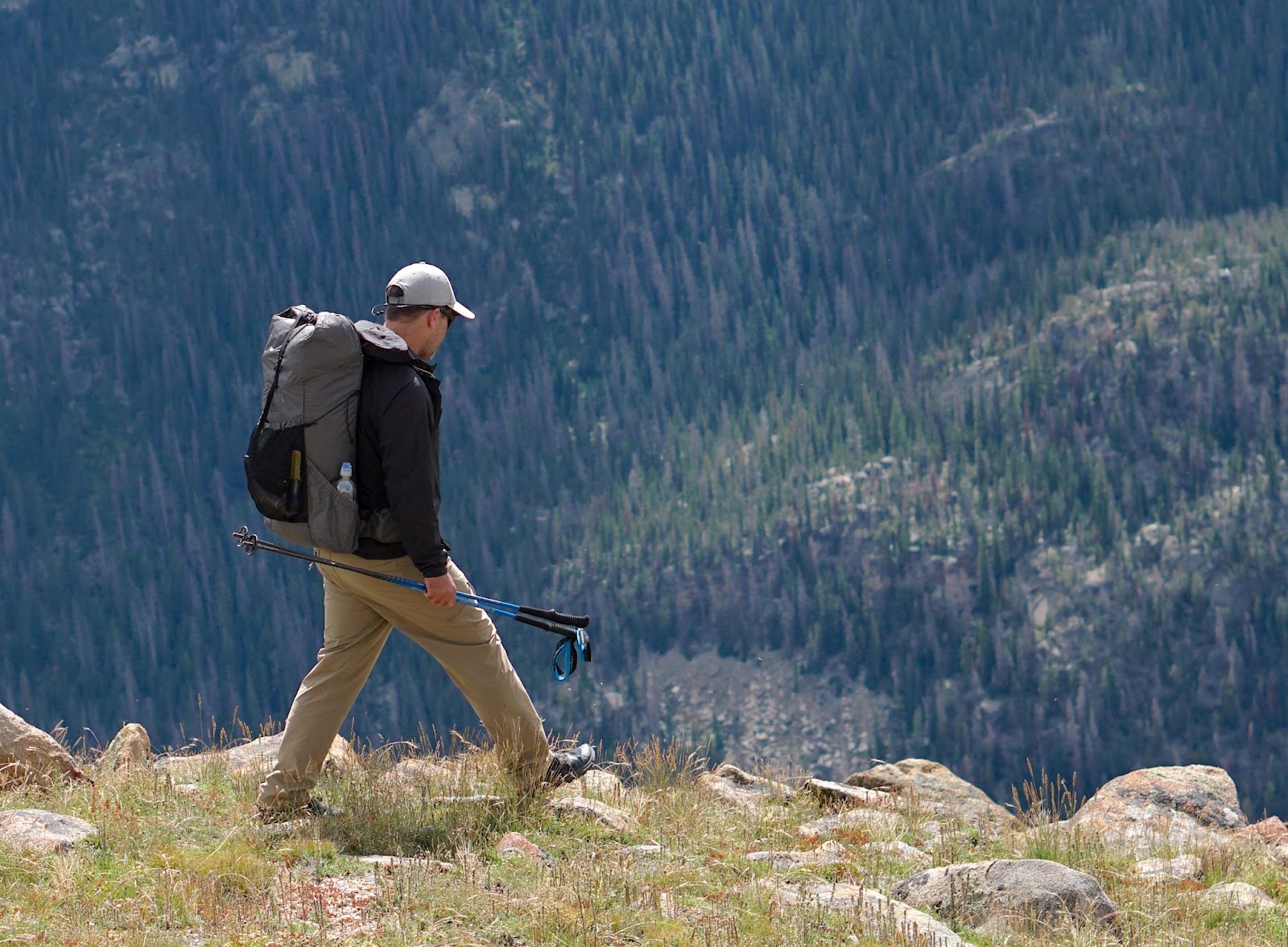
The most unique feature of the Kakwa pack is its manufacturer-claimed comfortable weight-carrying capacity of 45 pounds (20 kg). If that claim proves accurate, the Durston Gear Kakwa will be of particular interest to backpackers who favor small-and-light packs but encounter long-water carries or other occasions where heavy loads are unavoidable.
This review is based on our initial testing of the Durston Kakwa 40 backpack. We’ll update the review as further testing occurs through the fall.
Watch the video
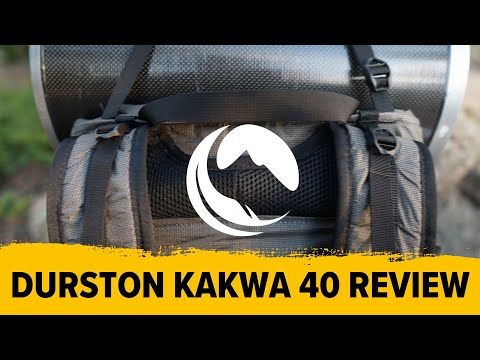
Watch this video on YouTube here.
Table of Contents
Table of Contents • Note: some sections may only be available to Premium or Unlimited Members.
- Introduction
- Watch the video
- Table of Contents
- Features & Specifications
- How we tested the Durston Kakwa 40 backpack
- Performance Analysis
- How much weight can the Durston Kakwa 40 carry comfortably?
- How many days of gear and supplies fit into the Durston Kakwa 40 backpack?
- How does the Ultra 200 fabric used in the Durston Kakwa 40 backpack compare to Dyneema Composite Hybrid 150 Fabric?
- Is it easy to access water bottles in the Durston Kakwa 40 side pockets?
- How to organize and stow gear, water, and snacks in the Durston Kakwa 40 pockets while hiking
- Durston Kakwa 40 backpack vs. Hyperlight Mountain Gear Junction 2400
- Commentary
- Dan Durston interview
- Learn more
- Related content
Features & Specifications
Materials & Construction:
- 3.5 oz/yd² ECOPAK EPL 200 Ultra fabric body, bottom, and side pockets
- polyester woven mesh front pocket
- YKK AquaGuard zippers
- double-stitched and bound seams
Suspension:
- inverted U-shaped 8 mm tubular aluminum internal frame (removable)
- load lifters
- foam back pad (removable)
- dual-strap reverse pull padded hip belt
- S-shaped padded shoulder straps
Organization & Compression:
- tall left side pocket (solid fabric) includes separate stash compartment with vertical zipper access that can be used while wearing the pack
- shorter right side pocket (solid fabric) with diagonal access can be used while wearing the pack
- rear mesh pocket
- hip-belt pockets with waterproof zippers (2)
- stretch shoulder strap pockets (2)
- Y-shaped top webbing strap (adjustable)
- hydration bladder compatible
Options:
- Size: small, medium, and large
Dimensions (varies based on size):
- Weight: 27.1 to 28.5 oz (770 to 810 g)
- Torso size ranges: 14.5 to 22.0 inches (37 to 56 cm)
- Hip belt circumference range: 28 to 42 inches (71 to 102 cm)
- Unrolled height: 31 to 35 inches (76 to 89 cm)
- Top circumference: 36 inches (91 cm)
- Bottom circumference: 31 inches (76 cm)
- Main compartment volume: 38 to 44 L
- External pocket volume: 15 L
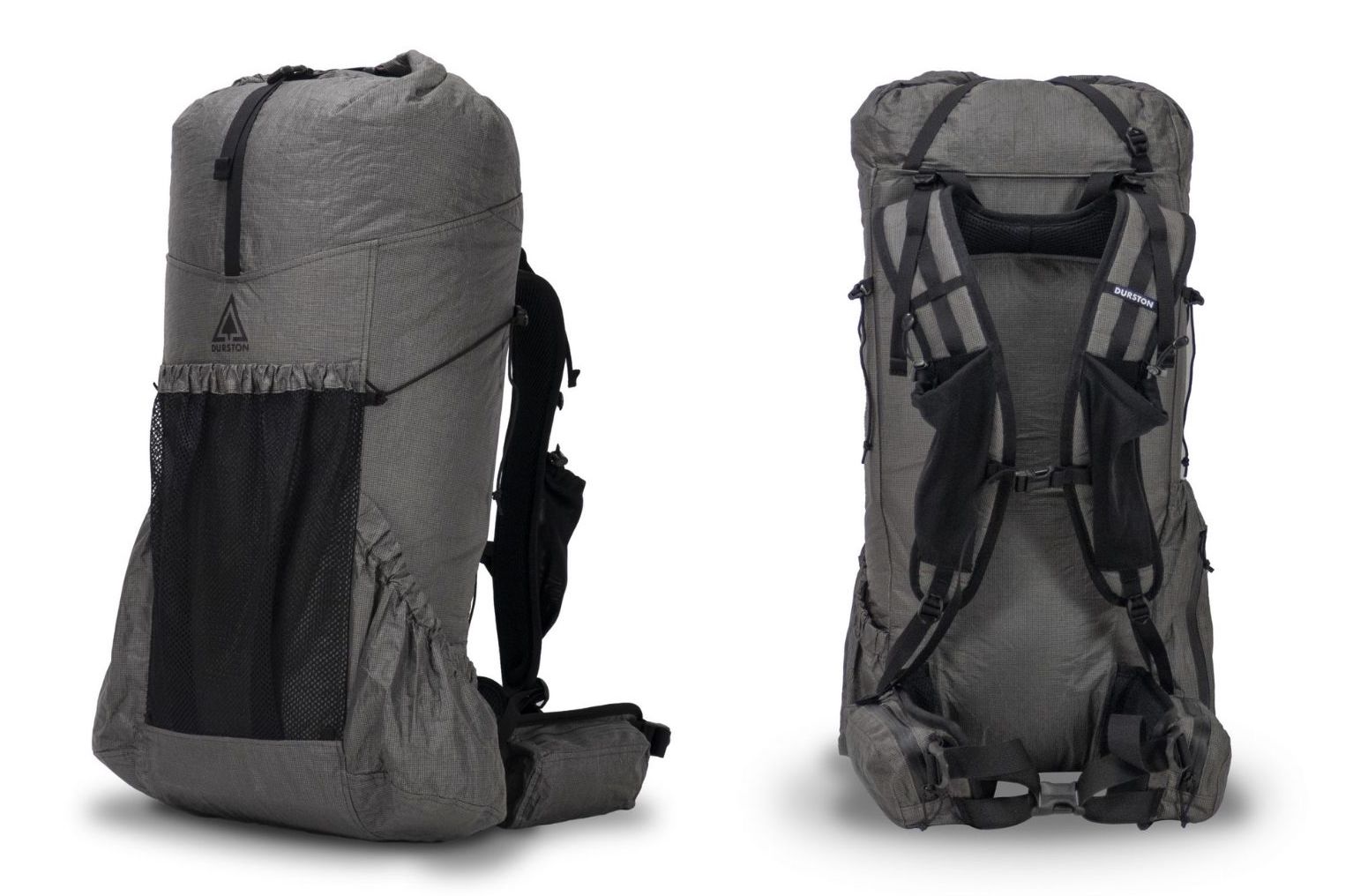
How we tested the Durston Kakwa 40 backpack
We tested two different size packs. Here’s some information about our body types other hikers can use as a frame of reference:
Andrew Marshall:
- Height: 5 feet 6 inches (168 cm)
- Weight: 175 pounds (75 kg)
- Torso size: 17.5 inches (44.5 cm)
- Chest: 42.5 inches (108 cm)
- Belly: 38.5 inches (98 cm)
- Hips: 32 inches (81 cm)
- Kakwa 40 backpack size: Small
Ryan Jordan:
- Height: 5 feet 7 inches (170 cm)
- Weight: 165 pounds (75 kg)
- Torso size: 17.375 inches (44 cm)
- Chest: 40 inches (102 cm)
- Belly: 35 inches (89 cm)
- Hips: 33 inches (91 cm)
- Kakwa 40 backpack size: medium
We measured torso size as the vertical distance from the top of the iliac crest to the 7th cervical vertebrae. Chest is measured as the circumference around the widest part of the chest, belly circumference is measured between the iliac crest and the bottom of the rib cage, and hips are measured at the widest part of the hip bones below the iliac crest.
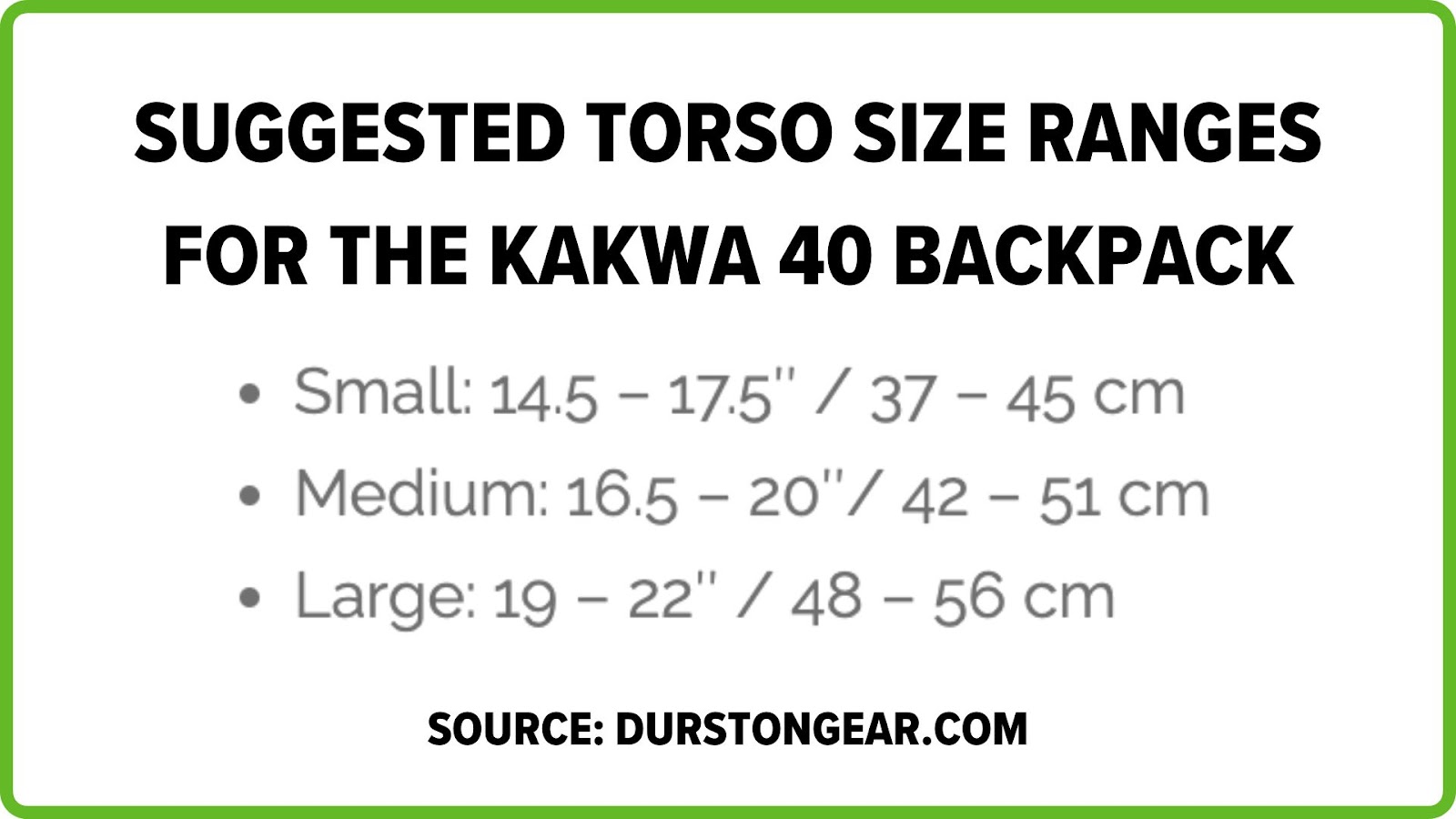
| Andrew | Ryan | |
|---|---|---|
| Locales | Sierra Nevada’s Tahoe basin (California/Nevada) | Rocky Mountain National Park and Comanche Peak Wilderness (Colorado) |
| Climate | late summer, mild weather with little-to-no precipitation | late summer with daily heavy rain from monsoonal thunderstorms |
| Terrain | on-trail hiking (dry, loose soils over hardpack), steep grades, below treeline | on-trail hiking (dry, loose soils over hardpack and mud), moderate grades, below and above treeline; off-trail alpine scrambling on granite, bushwhacking through forested terrain, willow bottoms, and deadfall-littered wildfire burn areas |
| Types of Hikes | 6+ hour day hikes | overnight and day hikes, 3 to 5 hours of hiking per day |
| Pack weights | 20 to 35 pounds (9 to 16 kg) | 27 to 53 pounds (12 to 24 kg) |
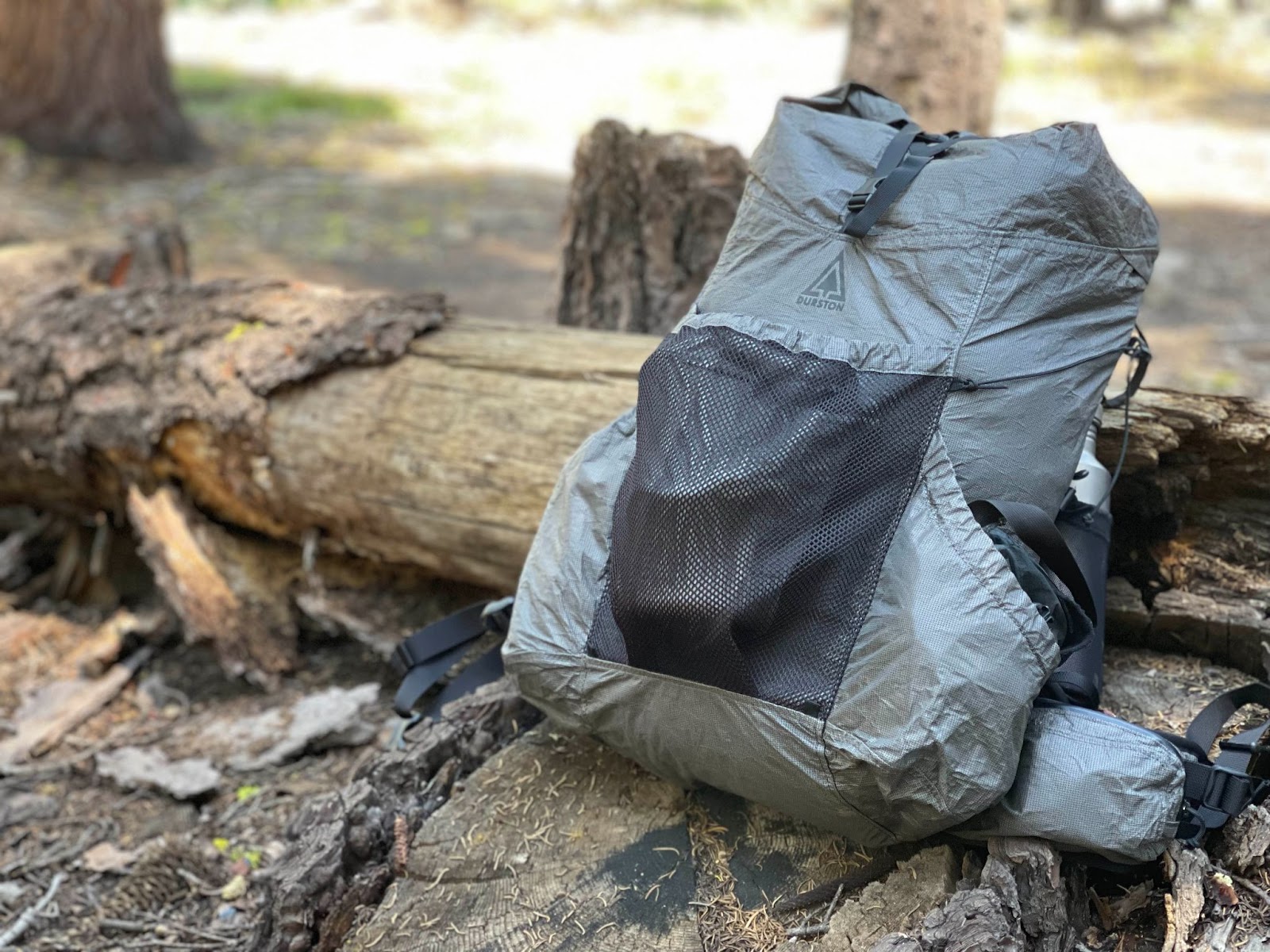
Performance Analysis
How much weight can the Durston Kakwa 40 carry comfortably?
The claimed comfort rating for the Durston Kakwa 40 is 45 pounds (20 kg). Ryan tested the Kakwa pack at this weight and found the u-shaped, inverted frame stiff enough to support those loads. In fact, the Kakwa 40 proved to be the only backpack in the sub-two-pound weight class that was capable of carrying more than 50 pounds without appreciable torso collapse.
Member Exclusive
A Premium or Unlimited Membership* is required to view the rest of this article.
* A Basic Membership is required to view Member Q&A events

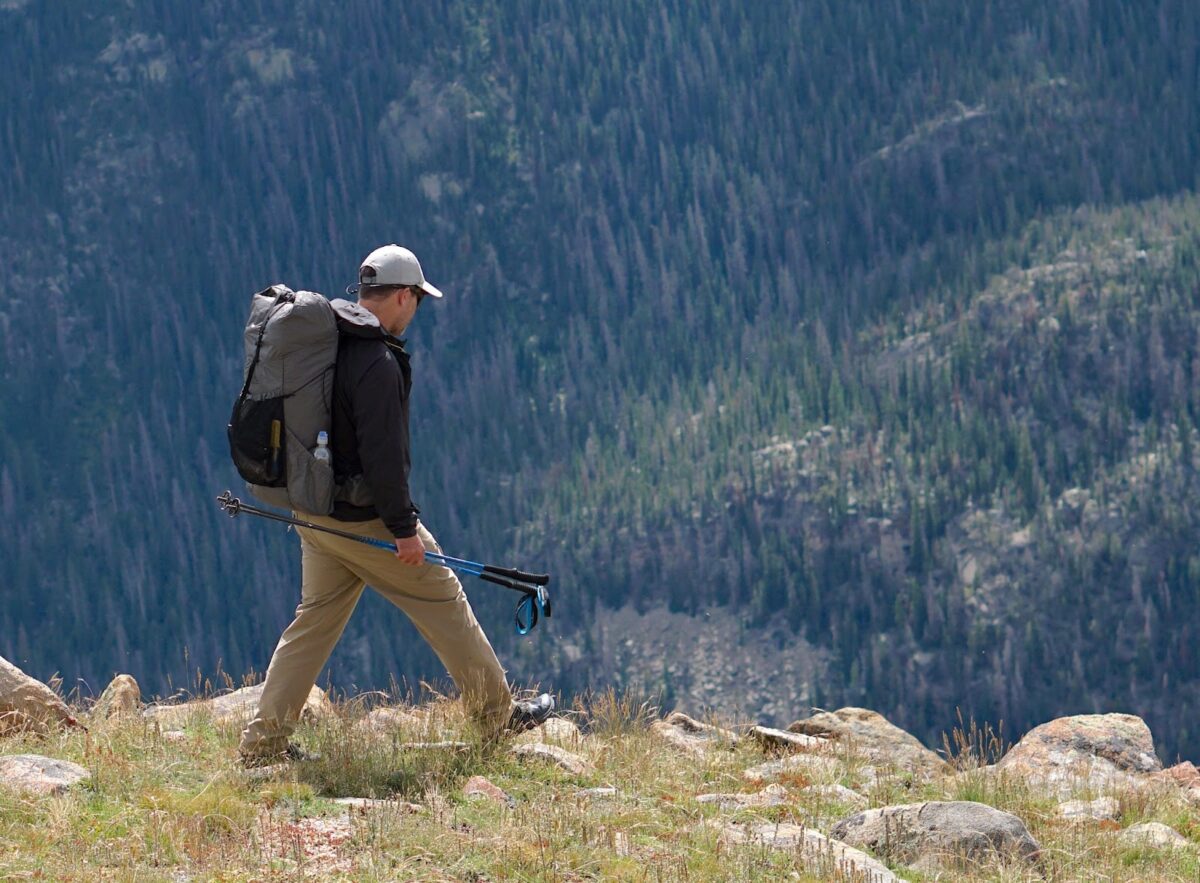


Home › Forums › Durston Kakwa 40 Review